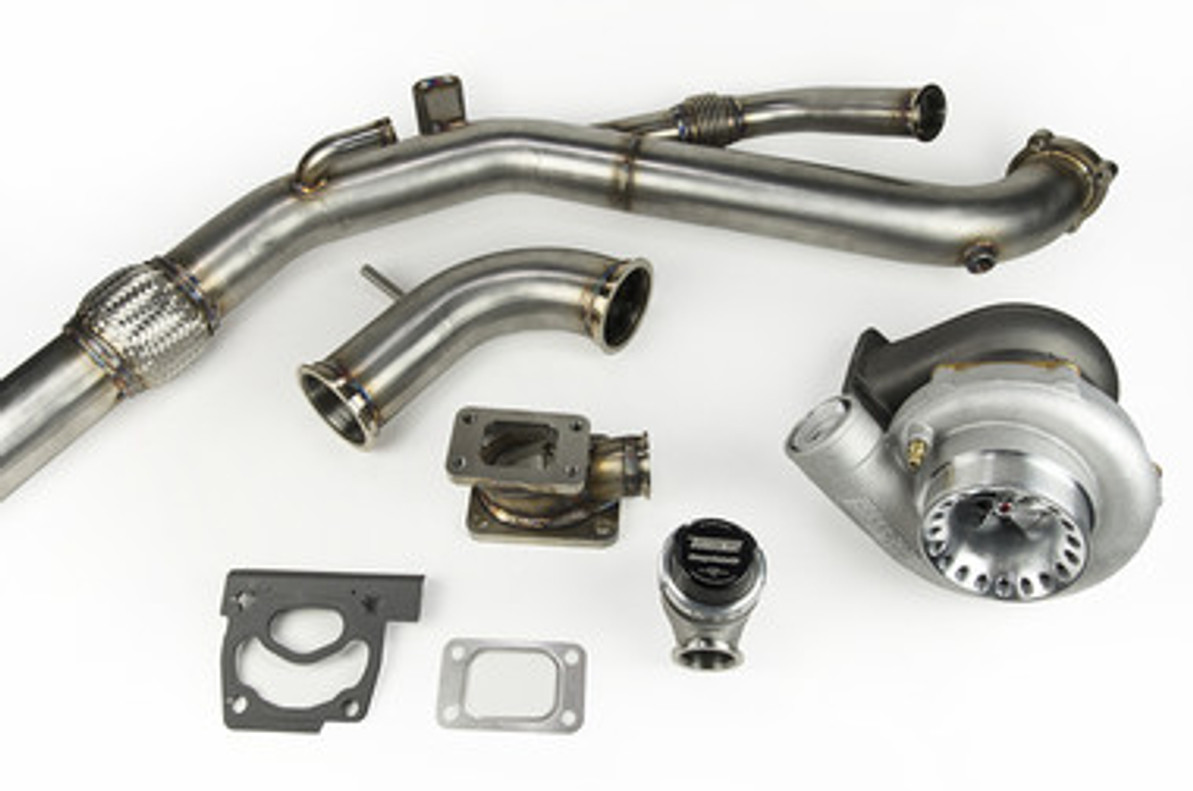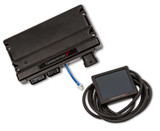Getting More Power out of the Ecoboost

Weighing in at around 150 lbs. less than the V8-equipped GT, the recent Ecoboost-powered Mustangs are a surprisingly good option for building a track car. Of course, with the right Ford Mustang performance parts, this engine can be made better, delivering better response and raising output to match or exceed the stock Coyote.
The Stock Engine
The Ecoboost 2.3l comes with Ford’s Ti-VCT variable timing system that alters
the relation of the cams to the crankshaft position. A direct injection system
sprays fuel into the cylinders to lower internal temperatures while creating a
combination lean and rich fuel mixture for better fuel economy. Together, these
technologies reduce the chance of knocking, allowing large amounts of
boost.
The engine is connected to a twin scroll turbocharger. This uses a conical
exhaust turbine driven by two exhaust channels: one channel sends exhaust gases
toward the narrow part of the turbine blades for increased speed, adding boost,
while the other channel sends gases toward the wide part of the blades,
increasing torque on the turbine to spool up faster for better response.
The intake uses a throttle-by-wire system which can be changed by selecting the
drive mode: normal mode is set up for smoothness when on the street, while
track mode maximizes response.
The engine starts building boost at around 2,500 rpm, adding boost in
increments of 10, 15 and 20 psi. Power peaks at 5,000 RPM and starts dropping
off around 5,500 RPM. The boost gauge in the stock cluster usually over-reports
actual boost coming out of the turbo.
Electronic Tuning
Even if you plan on leaving your Mustang mostly stock, there can be some major
improvements to power and drivability to be had by altering the engine tune.
There are three routes you can take depending on how far you want to push the
engine.
JMS makes two plug-and-play boxes to alter the stock tuning: the PedalMAX retunes
the throttle response for less lag, while their BoostMAX lets you increase
boost pressure on the fly. Both boxes can be used together for easy control
over the engine programming.
SCT’s X4 Power Flash programmer replaces the stock tuning with the company’s
own fuel and boost maps. This unit can also be used for data logging and has a
display that shows current running conditions. It gets its pressure information
directly from the intake manifold sensor, providing more accurate measurements
than the stock pressure gauge.
If you’re going well past the power available from the stock components, Ford
Racing offers a performance calibration kit that can be programmed with a
computer to dial in almost every setting on the engine.
Blow-Off Valve
The blow-off valve is used to redirect intake air to prevent runaway boost.
This valve is entirely mechanical, while the wastegate that feeds it is
electronic, allowing boost to be modified through tuning.
The stock plastic blow-off valve is known to fail even if the engine isn’t
modified, and it quickly becomes the weak point in the system once boost starts
being added. Switching to a billet wastegate like Turbosmart’s Kompact Shortie
will eliminate this problem and allow the turbo to support more boost.
Intake Cooling
Gases heat up as they’re compressed, leading to decreasing air density and
increased combustion chamber temperatures that can cause knocking. To
counteract this, a radiator called an “intercooler” is used to remove intake
heat to counteract these problems. The Ecoboost Mustang comes with a small
air-to-air intercooler which passes the intake air directly through the
radiator. Naturally, increasing boost also increases intake temperatures,
making this intercooler inadequate for performance applications.
Mishimoto make a near stock-sized intercooler that greatly increases fin area
and airflow for lower temperatures, while MAPerformance makes a much larger
intercooler that manages to fit in the stock location with all the original
hardware.
For short bursts of high boost pressure, we offer the Mr. Freeze methanol water
injection system. Adding these liquids to the intake drops temperatures
significantly, allowing the engine and turbo to be tuned to run at a higher PSI
and more advanced ignition timing for more power.
Bigger Turbo
The stock turbo can only pump so much air, but there’s still room to squeeze
more out of the engine. MAPerformance makes a kit that uses a Precision’s 5862
journal bearing turbocharger. Designed with racing in mind, it has a high
efficiency air chamber that supports more boost while keeping lag minimal. The
kit comes with all the supporting hardware including a blow-off valve that
handles up to 40 psi.
Get More from Your Ecoboost with Help
from Anderson Ford Motorsport
We may be famous for our work with small block Mustangs, but we’ve also spent
years helping people get more performance from forced induction motors. Whether
they were stock motors like the Ecoboost or Cobra, or built from the ground up,
we can provide you with everything you need for your build.
Recent Posts
-
Bringing the Fox Body Mustang into the 21st Century with Holley Terminator X
Anderson Ford Motorsport has been in the Fox Mustang performance industry since 1989. One of the bi …22nd Oct 2021 -
Roush Supercharger install on a 2019 Ford Mustang
Check out this 2019 Ford Mustang before and after we installed a Roush Supercharger. …21st Feb 2020 -
All Blower Installations are not Equal.
Why Should You Choose a Company to Install Your Blower That Has a Dyno Facility In-House?Are all de …24th Jan 2020


